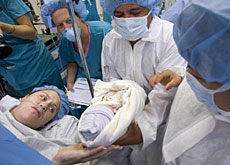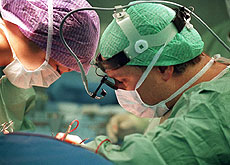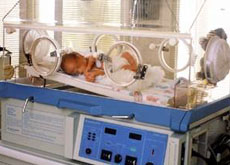Expectant mothers shun natural births

When a woman goes into a Swiss hospital to give birth, there is a one in three chance the baby will be delivered on the operating table.
The proportion of births by caesarian section in Switzerland has been steadily rising over the past few years and is now among the highest in Europe.
Expectant mothers and their doctors are increasingly convinced of the benefits of surgical delivery. Some gynaecologists have even begun advertising their willingness to carry out elective caesarians on their homepages.
But health insurers, who have to pick up the tab, are becoming uneasy.
According to the Federal Statistics Office, of the 67,000 hospital births in 2003, 29.2 per cent were caesarians. This compares with 27.5 per cent in 2002 and 26.3 per cent a year before.
However, there are large regional differences. In some rural areas, such as the Surselva valley, only one in ten births is by caesarian. But in rich areas of canton Zurich four in ten births are c-sections, and in a few areas – such as La Jonction in canton Geneva – that figure rises to one in two.
According to the Statistics Office, only one in three women undergoing a caesarian in 2003 was admitted to hospital as an emergency case, suggesting that many expectant mothers chose to go under the knife.
Express delivery
In some cases there are compelling reasons for surgery – for instance when the baby is especially large or is lying in a breech position. But, doctors agree, more and more women are opting for a speedy caesarian rather than settling in for a potentially long and arduous labour.
With an elective caesarian there is the additional bonus that the mother can determine the date on which her child is born. Recently there have been widely publicised cases of celebrity mums organising their babies’ births to fit in with their work or social commitments.
Michael Singer, president of the gynaecological association of canton Zurich, offers elective caesarians on his website.
Singer told the Tages-Anzeiger newspaper that there had been “a sea change in attitudes” towards this form of birth in recent years. But he said few women were opting for a caesarian purely as a lifestyle decision.
Although more caesarians are carried out in private than in public hospitals, social differences do not play an important role in a woman’s choice of birth, according to Professor Roland Zimmermann who heads the obstetrics clinic at Zurich University Hospital.
“Our patients are an international group and tend to come from the poorer sectors of society, but these women are just as keen on elective caesarians as women from a higher social echelon,” Zimmermann told swissinfo.
Fears
Carole Lüscher, the president of the Bern section of the Swiss midwives’ federation, says her impression is that women are more fearful of natural births than in the past and less prepared to tolerate the pain.
“Many women are asking ‘why should I put up with hours of pain when there is an alternative?’ It’s not just the number of caesarians that’s increasing, it’s also the use of epidural anaesthetics,” she told swissinfo.
“I think the problem is that women are uncertain. They look on the internet and know all the complications that can arise during birth. But no one supports them as women, as mothers. In my birth preparation courses I try to strengthen belief in the female body, which is designed to carry and deliver babies, and for breastfeeding.”
Zimmermann says many women are concerned about a loss of pelvic muscle tone after the birth of a baby, and for that reason they are increasingly requesting a caesarian.
And he says that there are medical arguments to support this fear: “It is medically proven that women who have had caesarians are statistically much less likely to experience bladder weakness or incontinence.”
But Lüscher – whose own three children were all born naturally – says vaginal birth is still best for mother and baby and should be the preferred option.
“If women knew more about natural birth, for example how perfectly the mother’s and child’s bodies coordinate the birth, they would be more inclined to choose it.”
She says doctors and midwives are increasingly anxious about litigation in the event of things going wrong and tend to favour caesarians when natural births appear risky.
However Zimmermann disputes this, saying legal action against obstetricians is very rare.
Footing the bill
Switzerland’s health insurers have started to grumble about the high cost of caesarian births.
According to the Statistics Office, a straightforward c-section costs twice as much as a normal vaginal birth.
Peter Marbet of the health insurers’ federation, santésuisse, told the TagesAnzeiger that insurance companies were only obliged to cover the costs of a caesarian if it was medically justified. But doctors could almost always come up with a reason, he said.
He says in view of the rising costs, health insurers might have to consider excluding clinics with high rates of caesarians from their list of approved hospitals.
Zimmermann says it is for legal experts to determine whether under the health insurance law insurers have to pay for non-essential surgery, and speculates that in future insurers might require women undergoing an elective caesarian to pay part of the cost themselves.
swissinfo, Morven McLean
According to the Federal Statistics Office:
In 2003, 29.2% of hospital births were caesarian deliveries.
The rate in neighbouring Germany was 25.5%.
In 2002, 27.5% of hospital births were c-sections.
In 2001, caesarian sections made up 26.3% of hospital births.

In compliance with the JTI standards
More: SWI swissinfo.ch certified by the Journalism Trust Initiative










You can find an overview of ongoing debates with our journalists here . Please join us!
If you want to start a conversation about a topic raised in this article or want to report factual errors, email us at english@swissinfo.ch.